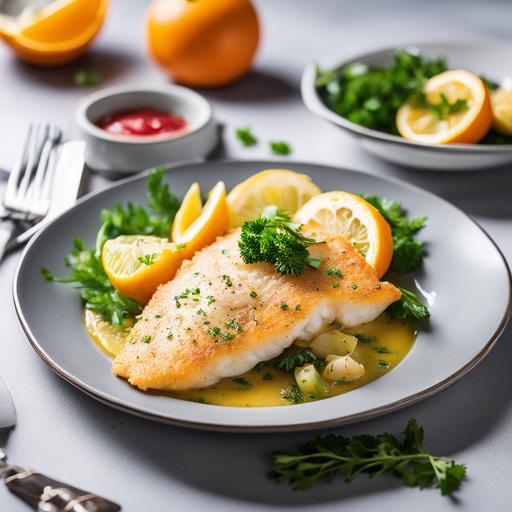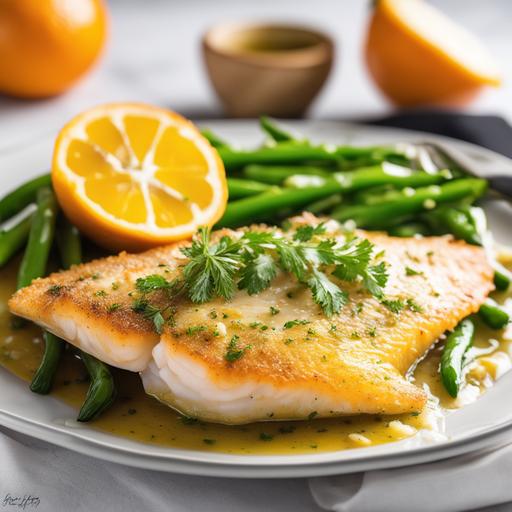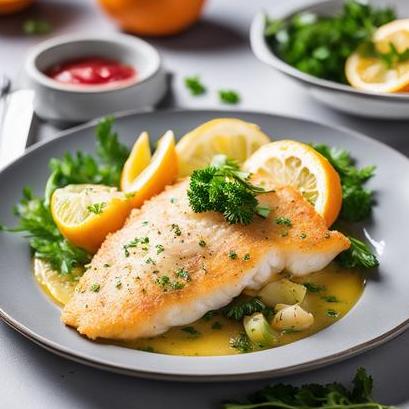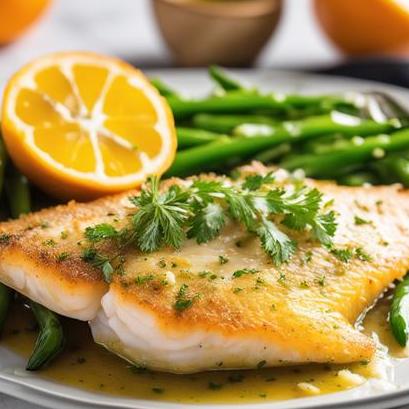
Orange Roughy Oven Recipe: The Perfect Dinner For Any Occasion
Orange roughy is a delicious and versatile fish known for its delicate flavor and firm texture. Cooking orange roughy in the oven is a fantastic way to preserve its natural taste while creating a mouthwatering dish that is both healthy and easy to prepare. In this comprehensive guide, we will explore the food science behind cooking orange roughy in an oven, discuss the importance of choosing the right ingredients, provide detailed instructions on preparing the fish, and share a delectable oven recipe that will surely impress your family and guests.
Food Science Of Cooking Orange Roughy In An Oven
Understanding the science behind cooking orange roughy in an oven is crucial for achieving optimal results. Orange roughy is a lean fish with low levels of natural fats, making it susceptible to drying out if overcooked. However, the firm texture of orange roughy allows it to hold up well to various cooking methods, including baking in the oven.
When orange roughy is cooked in the oven, the dry heat surrounds the fish, gently cooking it from the outside in. This method helps to retain the moisture within the fish while allowing the exterior to develop a beautiful golden crust. Additionally, baking in the oven allows for even cooking, ensuring that the fish is cooked through evenly without any raw spots.
Choosing Ingredients
Selecting high-quality ingredients is essential for creating a delicious orange roughy dish. When choosing orange roughy fillets, look for ones that are firm, moist, and free from any unpleasant odors. Fresh or thawed frozen fillets are both suitable options, but ensure that frozen fillets are properly thawed before cooking to prevent uneven cooking.
In addition to the fish, consider the accompanying ingredients that will enhance the flavor of the dish. Fresh herbs such as parsley, dill, or thyme can add a burst of freshness, while citrus fruits like lemon or orange can lend a subtle brightness to the dish. Olive oil or melted butter can be used to coat the fish and keep it moist during cooking.
Preparing Ingredients

Before cooking, it is essential to properly prepare the ingredients to ensure a successful dish. Begin by rinsing the orange roughy fillets under cold water to remove any debris or residue. Pat the fillets dry with paper towels to ensure that they are completely dry, as excess moisture can prevent proper browning during cooking.
Next, season the fillets generously with salt and pepper to enhance their natural flavors. Optionally, you can add additional seasonings such as garlic powder, paprika, or herbs to customize the flavor to your preference. Allow the fillets to rest at room temperature for a few minutes to absorb the seasonings while you preheat the oven.
Optimal Oven Cooking Temperature & Timing
Setting the correct oven temperature and timing is crucial for achieving perfectly cooked orange roughy. Preheat your oven to 400°F (200°C) to ensure that it is fully heated before placing the fish inside. This high temperature allows the fish to cook quickly while developing a crispy exterior.
Once the oven is preheated, place the seasoned orange roughy fillets on a baking sheet lined with parchment paper or aluminum foil. Ensure that the fillets are spaced apart to allow for even cooking. Place the baking sheet in the center of the preheated oven and bake for 12-15 minutes, or until the fish is opaque and flakes easily with a fork.
Avoid overcooking the orange roughy, as this can result in dry and tough flesh. Keep a close eye on the fillets towards the end of the cooking time to prevent them from becoming overdone. Once cooked, remove the fillets from the oven and allow them to rest for a few minutes before serving to allow the juices to redistribute.
Orange Roughy Oven Recipe
Ingredients
- 4 orange roughy fillets
- Salt and pepper to taste
- 2 tablespoons olive oil or melted butter
- 2 cloves garlic, minced
- 1 lemon, thinly sliced
- Fresh parsley, chopped, for garnish
Instructions
- Preheat your oven to 400°F (200°C) and line a baking sheet with parchment paper or aluminum foil.
- Rinse the orange roughy fillets under cold water and pat them dry with paper towels.
- Season the fillets generously with salt and pepper on both sides.
- Place the seasoned fillets on the prepared baking sheet, ensuring they are spaced apart.
- Drizzle the olive oil or melted butter over the fillets, then sprinkle the minced garlic on top.
- Arrange the lemon slices on top of each fillet.
- Bake the orange roughy in the preheated oven for 12-15 minutes, or until the fish is opaque and flakes easily with a fork.
- Once cooked, remove the fillets from the oven and let them rest for a few minutes.
- Garnish with freshly chopped parsley before serving.
Cooking orange roughy in the oven is a simple yet elegant way to enjoy this delectable fish. By understanding the food science behind oven cooking and following the proper techniques, you can create a dish that is moist, flavorful, and sure to impress. Whether you’re hosting a dinner party or preparing a weeknight meal for your family, this orange roughy oven recipe is sure to become a favorite in your culinary repertoire.
Doneness Checks

Orange roughy, also known as deep-sea perch, is a species of fish found in deep waters around the world. It has a delicate texture and a mildly sweet flavor, making it a popular choice for seafood lovers. When cooked properly, orange roughy is moist, tender, and delicious.
Cooking orange roughy in the oven is a convenient method that requires minimal effort and yields fantastic results. By baking the fish, you can lock in its natural juices and flavors, resulting in a moist and flavorful dish.
Determining the doneness of orange roughy is crucial to achieving the perfect texture and flavor. Here are some methods to check if your fish is cooked to perfection:
1. Visual Inspection
- Color: The flesh of orange roughy should turn opaque and white when cooked. Look for a uniform white color throughout the fish.
- Texture: The flesh should be firm yet tender, and it should flake easily with a fork.
2. Internal Temperature
- Use a meat thermometer to check the internal temperature of the fish. Orange roughy is done when it reaches an internal temperature of 145°F (63°C).
3. Time
- As a general guideline, cook orange roughy for 10-12 minutes per inch of thickness in a preheated oven set to 375°F (190°C). However, cooking times may vary depending on the thickness of the fillets and individual oven settings.
Undercooking
Undercooking orange roughy can result in a raw, unpleasant texture and pose a risk of foodborne illness. If you suspect that your fish is undercooked, here are some steps you can take:
- Return the fish to the oven and continue cooking until it reaches the desired doneness.
- Use a meat thermometer to ensure that the internal temperature reaches 145°F (63°C).
- Check the texture of the fish; it should be firm and opaque.
Overcooking
Overcooking orange roughy can cause it to become dry, tough, and flavorless. To prevent overcooking, follow these tips:
- Monitor the cooking time closely and avoid leaving the fish in the oven for longer than necessary.
- Use a meat thermometer to prevent overcooking. Remove the fish from the oven when it reaches an internal temperature of 145°F (63°C).
- If you accidentally overcook the fish, serve it with a sauce or garnish to add moisture and flavor.
Troubleshooting

Encountering issues while cooking orange roughy is not uncommon, but with the right techniques, you can overcome them. Here are some common problems and solutions:
1. Dry Fish
- Overcooking is the primary cause of dry fish. To salvage dry orange roughy, serve it with a sauce or drizzle it with olive oil to add moisture.
- Alternatively, you can flake the dry fish and use it in salads, soups, or casseroles where moisture can be added.
2. Fish Falling Apart
- Orange roughy has delicate flesh that can easily fall apart if mishandled. To prevent this, handle the fish gently when transferring it to and from the oven.
- Use a spatula or fish turner to support the fillets when flipping or removing them from the baking dish.
3. Fishy Odor
- Fresh orange roughy should have a mild, slightly sweet aroma. If your fish smells overly fishy, it may not be fresh. Purchase fish from a reputable source and store it properly in the refrigerator until ready to use.
Recipe Variations
While this oven recipe provides a basic method for cooking orange roughy, there are countless variations and flavor combinations to explore. Here are some ideas to inspire your culinary creativity:
1. Citrus Herb Marinade
- Marinate the orange roughy fillets in a mixture of lemon juice, olive oil, minced garlic, fresh herbs (such as thyme or parsley), salt, and pepper for 30 minutes before baking. This will infuse the fish with bright citrus flavors and aromatic herbs.
2. Cajun Spice Rub
- Coat the fish with a Cajun spice rub made from paprika, cayenne pepper, garlic powder, onion powder, thyme, oregano, salt, and pepper. Bake the fish until cooked through, and serve it with a side of rice and sautéed vegetables for a spicy and satisfying meal.
3. Asian-Inspired Glaze
- Make a glaze using soy sauce, honey, ginger, garlic, and sesame oil. Brush the glaze onto the orange roughy fillets before baking, and garnish with sliced green onions and sesame seeds for a deliciously savory dish with an Asian flair.
Cooking orange roughy in the oven is a simple and delicious way to enjoy this versatile seafood. By following the tips and techniques outlined in this guide, you can ensure that your orange roughy turns out perfectly cooked every time. Whether you stick to the classic recipe or experiment with different flavors and ingredients, you’re sure to create a memorable dish that will impress your family and friends. So preheat your oven, grab some fresh orange roughy fillets, and get ready to enjoy a flavorful seafood feast!
Flavour Enhancement Tips
Orange roughy is a delectable and versatile fish known for its mild flavor and delicate texture. When cooked properly, it can delight the taste buds with its tender flesh and subtle taste.
The key to a mouthwatering orange roughy dish lies in enhancing its natural flavors. Here are some tips to elevate the taste of your fish:
1. Citrus Marinade
Marinating the orange roughy in citrus juices such as lemon or lime adds a refreshing tanginess to the fish. The acidity helps to tenderize the flesh while infusing it with a zesty flavor. Combine the citrus juice with some olive oil, garlic, herbs like parsley or dill, and a pinch of salt and pepper for a flavorful marinade.
2. Seasoning Blend
Create a custom seasoning blend to complement the delicate flavor of orange roughy. A combination of paprika, garlic powder, onion powder, dried thyme, and a hint of cayenne pepper adds depth and complexity to the dish without overpowering the fish’s natural taste. Rub the seasoning blend onto the fish before cooking for maximum flavor infusion.
3. Fresh Herbs
Fresh herbs such as parsley, basil, or cilantro can enhance the aroma and flavor of orange roughy. Sprinkle chopped herbs over the fish before serving to add a burst of freshness and vibrancy to each bite. Alternatively, you can mix finely chopped herbs into butter or olive oil and drizzle it over the cooked fish for an extra layer of flavor.
Texture Enhancement Tips

Achieving the perfect texture is crucial when cooking orange roughy. Here’s how to ensure your fish turns out tender and succulent:
1. Gentle Handling
Orange roughy has delicate flesh that can easily break apart if mishandled. When preparing the fish, be gentle to avoid tearing or damaging the fillets. Use a sharp knife to cut the fish into portions, and handle them with care when transferring them to the baking dish or serving platter.
2. Proper Cooking Time
Avoid overcooking the orange roughy, as it can become dry and lose its delicate texture. Bake the fish just until it flakes easily with a fork, typically around 10-12 minutes per inch of thickness. Keep a close eye on the fish while it’s in the oven to prevent it from becoming overcooked.
3. Moisture Retention
To help retain moisture and prevent the fish from drying out, consider adding a liquid to the baking dish. You can use broth, white wine, or even a splash of citrus juice to create a flavorful steam bath for the fish. Covering the dish with foil during baking can also help trap moisture and keep the fish tender.
Cooking At Different Temperatures
The oven temperature plays a significant role in the outcome of your orange roughy dish. Here’s how to adjust the cooking temperature for optimal results:
1. Moderate Heat (350°F/175°C)
Baking orange roughy at moderate heat allows it to cook evenly without drying out. Preheat your oven to 350°F (175°C) and bake the fish for approximately 10-12 minutes per inch of thickness. This gentle cooking method ensures that the fish remains tender and moist.
2. High Heat (400°F/200°C)
If you prefer a slightly crispy exterior, you can opt for a higher cooking temperature. Preheat your oven to 400°F (200°C) and bake the orange roughy for a shorter duration, around 8-10 minutes per inch of thickness. The higher heat will help to caramelise the seasoning and create a golden crust on the fish.
3. Low And Slow (300°F/150°C)
For a more gentle cooking process that preserves the fish’s delicate texture, you can choose to bake the orange roughy at a lower temperature. Preheat your oven to 300°F (150°C) and bake the fish for a longer period, approximately 12-15 minutes per inch of thickness. This slow-cooking method results in incredibly tender and juicy fish.
Cooking Tips
To ensure a successful orange roughy oven recipe, here are some additional cooking tips to keep in mind:
1. Use A Baking Dish
Place the orange roughy fillets in a baking dish large enough to accommodate them without overcrowding. This allows for even cooking and ensures that the fish remains tender and moist.
2. Check For Doneness
To determine if the orange roughy is cooked through, use a fork to gently flake the flesh. If it flakes easily and appears opaque all the way through, it’s done. Avoid overcooking the fish, as it can become dry and rubbery.
3. Garnish Before Serving
Add a finishing touch to your orange roughy dish by garnishing it with fresh herbs, citrus slices, or a drizzle of sauce. This not only enhances the presentation but also adds an extra layer of flavor and freshness to the dish.
Serving Suggestions
Now that your orange roughy is perfectly cooked, it’s time to serve it up in style. Here are some serving suggestions to elevate your dining experience:
1. Lemon Wedges
Serve the orange roughy with lemon wedges on the side, allowing diners to squeeze fresh lemon juice over their fish for a burst of citrus flavor.
2. Steamed Vegetables
Pair the orange roughy with a side of steamed vegetables such as asparagus, broccoli, or green beans for a nutritious and well-balanced meal.
3. Herb Butter Sauce
Drizzle the orange roughy with a homemade herb butter sauce made from melted butter, garlic, and chopped herbs. The rich and flavorful sauce enhances the taste of the fish and adds a touch of indulgence to the dish.
Conclusion
Cooking orange roughy in the oven is a simple yet elegant way to enjoy this delicious seafood delicacy. By following the tips and techniques outlined in this article, you can create a flavorful and tender dish that will impress your family and friends. Whether you prefer a citrus-infused marinade or a custom seasoning blend, there are endless possibilities for creating mouthwatering orange roughy recipes. So fire up your oven, gather your ingredients, and get ready to savor every bite of this delectable fish dish.
FAQS
What Are The Ingredients Needed For An Orange Roughy Oven Recipe?
To prepare orange roughy in the oven, you will need the following ingredients:
- 4 orange roughy fillets
- 2 tablespoons of olive oil
- 1 teaspoon of garlic powder
- 1 teaspoon of paprika
- 1/2 teaspoon of salt
- 1/4 teaspoon of black pepper
- Fresh lemon slices for garnish (optional)
- Fresh parsley for garnish (optional)
How Do I Preheat The Oven For Cooking Orange Roughy?
Preheat your oven to 400°F (200°C) before you begin preparing the orange roughy fillets. This temperature ensures even cooking and a crispy texture for the outer layer of the fillets.
How Long Does It Take To Cook Orange Roughy In The Oven?
The cooking time for orange roughy in the oven depends on the thickness of the fillets. Generally, it takes about 12-15 minutes for a fillet that is about 1-inch thick. You can always check for doneness by inserting a fork into the thickest part of the fillet – if it easily flakes and is opaque, it is cooked through.
Can I Use A Different Type Of Seasoning For The Orange Roughy?
Absolutely! While the suggested combination of garlic powder, paprika, salt, and black pepper provides a tasty flavor profile for the orange roughy, you can experiment with other seasonings as well based on your personal preferences. Some alternative options you can consider include lemon pepper, Cajun seasoning, or a simple herb blend.
How Should I Serve The Cooked Orange Roughy?
Once the orange roughy is cooked to perfection, you can serve it hot as a standalone dish or pair it with various sides. It goes wonderfully with steamed vegetables such as broccoli or asparagus, a fresh garden salad, or even a side of flavorful rice or quinoa. Squeezing some fresh lemon juice over the cooked fillets and garnishing with lemon slices and parsley adds a bright and vibrant touch to the presentation as well.


